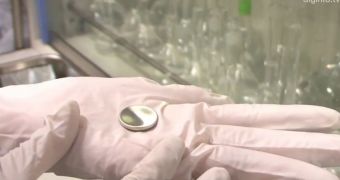Japan may soon be rid of its dependency on foreign lithium, which it needs to create advanced lithium-ion batteries. According to a team of experts at the Tokyo University of Science, a material called hard carbon, obtained by pyrolyzing sucrose, can make effective anodes for a new class of batteries.
Sucrose is the main ingredient of sugars, the team goes on to say. Through this innovation, the Japanese science team becomes one of the first groups to develop an effective material that can be used in the anodes of sodium-ion batteries.
Since the raw materials needed would be cheaper, and also locally-made, the costs associated with Na-ion batteries would be significantly lower than those of standard, Li-ion batteries. Lithium is a rare element that is very expensive, and the Asian nation must import 100 percent of what it needs.
The research group was led by TUS associate professor Shinichi Komaba. He explains that, unlike lithium, sodium can be found in abundance, almost in unlimited quantities, at very low prices.
“Also, sodium ion batteries can be made using iron, aluminum, and sodium, rather than cobalt or copper as before. What's more, our results show that battery capacity can be increased simply by using carbon made from sugar as the anode,” the investigator explains.
“So high-performance batteries like expensive lithium batteries, which are an important type of rechargeable battery, may be achievable using cheaper, more abundant materials,” he goes on to say.
Komaba and his group believe that additional improvements brought to the new technology could make it competitive – in the sense that it could go toe-to-toe with standard lithium-ion batteries – within a few years.
“We believe that, if the technology and performance can be improved, development may progress toward practical batteries,” he says. According to Komaba, a future in which Li-ion batteries are completely replaced by the new approach is not improbable.
He says that hard carbon can be obtained simply by heating sucrose in an electric furnace, in the absence of oxygen. The material burns if exposed to oxygen, but heating it in an atmosphere of argon or nitrogen (inert gases), to temperatures of 1,000 to 1,500 degrees Celsius, results in black carbon.
“Actually, we've spent about seven years researching sodium ion batteries. We've gained a lot of know-how regarding electrolytes and cells for such batteries. We have all the reagents needed right here,” Komaba concludes.

 14 DAY TRIAL //
14 DAY TRIAL //